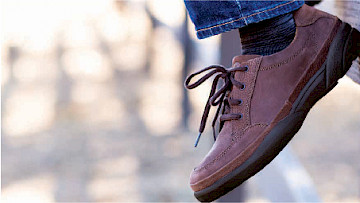Do you have to swell in your ankles or legs? Do your legs feel heavy or ache a lot? Do you have poor circulation in your feet, ankles, or legs? If you answered to yes to any of these questions, you may want to check out compression socks. Compression socks help the blood return to your heart through therapeutic compression around your ankles. The strongest compression level is at the ankle while the compression decreases as the socks go up the leg, which promotes better circulation in the legs.
Types of compression socks
There are many different styles and levels of compression socks that are available.
The basic level of compression is at 15-20 mmHg which can be bought over the counter, but it’s not covered by private insurance. The size of these socks is determined by your shoe size.
Wearing compression socks when you are traveling will reduce the risk of blood clot
The most frequently prescribed compression sock is at 20-30 mmHg and it’s a medical grade compression sock that is covered by private insurance. You measure your legs in the morning to determine your required size. If you have a severe case of swelling or varicose veins, you may be prescribed compression socks of 30-40 mmHg. These are also medical grade, which can be covered by private insurance, and you measure them the same way as the 20-30 mmHg compression socks.
There are many different colors and patterns to choose from, and they usually come in knee high, thigh high, or as pantyhose.
Why choose compression socks?
As mentioned above, compression stockings help with your circulation in your legs to avoid any swelling and pain, plus it helps prevent blood clots from developing. They are especially good for people who travel a lot or for pregnant women. When you are traveling, you are usually sitting down and your legs are staying still. Blood clots are a big risk when your legs are restricted for an extended period of time. Wearing compression socks when you are traveling will reduce the risk of blood clots by promoting your circulation. Gentle pressure is applied by the socks which allow your blood to flow back to your heart and prevents blood from pooling in your feet or ankles. While pregnant, one in two women will experience heavy and swollen legs which can result in varicose veins. Blood volume increases by about ⅕ and your vein walls become more elastic due to progesterone when the child is conceived. As the belly grows, the veins are under a lot of pressure that they may not be used to, making it difficult to pump blood back into your heart. This is what causes blood to pool and where the swelling in your legs come from. Wearing compression socks while pregnant can help blood flow back into your heart, preventing swelling and decreases the risk of varicose veins developing in your legs. If you have stiff or achy legs, swollen feet and ankles, bulging veins, if you travel a lot for work, or if you are pregnant, SBK Shoes & Orthotics will help you find the perfect pair of compression socks to suit your needs!




